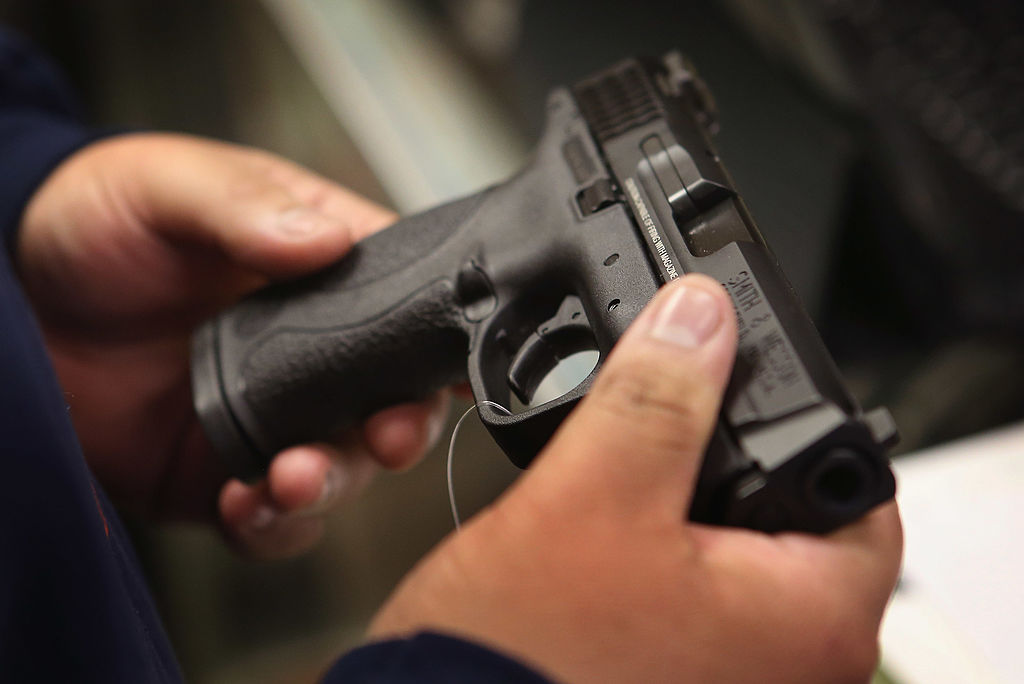The Biden administration is targeting individuals who sell firearms online and at gun shows in the latest attempt by the White House to curtail Americans’ Second Amendment rights.
Attorney General Merrick Garland announced that through the use of a 2022 gun control law that was pushed by some Republicans, the Justice Department would be closing the so-called gun show loophole.
Republican Sen. John Cornyn, of Texas, who was among those who pushed for the passage of the Bipartisan Safer Communities Act, was among those who slammed Garland and the White House.
The attorney general announced late Wednesday that some people who sell firearms but do not own gun shops must now register as licensed firearms agents.
As a result, an estimated 23,000 individuals will now be required to conduct background checks in order to transfer lawfully owned firearms during otherwise legal private exchanges, CBS News reported.
“Under this regulation, it will not matter if guns are sold on the internet, at a gun show, or at a brick-and-mortar store: if you sell guns predominantly to earn a profit, you must be licensed, and you must conduct background checks,” Garland said at a news conference.
Today, the Justice Department has announced the “Engaged in the Business” Final Rule – an updated and clear definition of who must obtain a license and conduct a background check before selling firearms.
🔗: https://t.co/kft2H0HteD pic.twitter.com/10c4f4kcNs
— U.S. Department of Justice (@TheJusticeDept) April 11, 2024
He further claimed that guns purchased from non-licensed sellers were being found at crime scenes across the country.
Garland declined to offer any specifics or to expound upon the claim but he said going after private gun sellers “will save lives.”
In a news release, the DOJ said Garland was cleared to institute new rules requiring thousands of people to apply for licenses at the direction of President Joe Biden.
The DOJ stated:
“On March 14, 2023, President Biden issued Executive Order 14092, which, among other things, directs the Attorney General to develop and implement a plan to clarify the definition of who is engaged in the business of dealing in firearms and thus required to obtain a federal firearms license.
“The Final Rule conforms the ATF regulations to the new BSCA definition and further clarifies the conduct that presumptively requires a license under that revised definition, among other things.”
A representative for Cornyn described Garland’s directive as an “unconstitutional rule” in a comment to CBS News.
Cornyn and Sen. Thom Tillis, of North Carolina, had already described plans to implement the DOJ’s new gun control measure as an attempt to “rewrite the law” and to “go against congressional intent,” CBS News further reported.
The DOJ’s new rule could force many people who only occasionally sell firearms at places such as gun shows into a mountain of paperwork by making them apply for Federal Firearms Licenses.
While the White House and other gun rights opponents often portray gun shows as forums in which people can simply walk in and buy whatever they want anonymously, that is not the case.
Some gun sellers at these shows are selling firearms that they purchased wholesale with the intent to sell them to new customers.
Those sellers are required to obtain and maintain FFLs.
The people being targeted by Garland’s new directive are largely private individuals engaging in private transactions with used guns.
Private transfers of firearms among individuals are not illegal. However, there are some restrictions on how those transfers must be conducted in some states, the Bureau of Alcohol, Tobacco, Firearms and Explosives notes.
The ATF says of the matter on its website:
“Although it’s legal under federal law for a private seller to sell a firearm to a resident of his or her own state, private sellers have no way of checking to see if the buyer is legally able to possess a firearm.
“Private sellers generally do not have access to complete background checks. Note, however, that some states may require potential purchasers to undergo background checks, and have set up systems to meet that requirement.”
The DOJ’s new directive will not affect firearms transfers among family members.
This article appeared originally on The Western Journal.

























 Continue with Google
Continue with Google